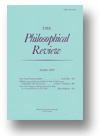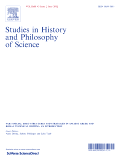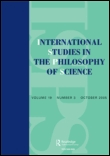
PHILOSOPHY OF SCIENCE
Scope & Guideline
Cultivating Insight into the Nature of Scientific Knowledge
Introduction
Aims and Scopes
- Philosophical Analysis of Scientific Methodologies:
The journal critically examines various scientific methodologies, including quantitative and qualitative approaches, thereby exploring their philosophical implications and limitations. - Interdisciplinary Dialogue:
It promotes dialogue among various disciplines, integrating insights from philosophy, science, and other fields to foster a comprehensive understanding of complex scientific issues. - Exploration of Scientific Concepts:
The journal focuses on the conceptual foundations of scientific theories, including notions of causation, explanation, and objectivity, thereby contributing to the epistemological discourse. - Ethical and Social Implications of Science:
It addresses the ethical dimensions and social responsibilities inherent in scientific practices, particularly as they relate to issues like racism, justice, and public trust in science. - Advancements in Theoretical Frameworks:
The journal is committed to discussing and developing novel theoretical frameworks that can enhance our understanding of scientific phenomena, including discussions on realism, anti-realism, and the nature of scientific laws.
Trending and Emerging
- Quantum Theory and Its Interpretations:
Recent papers indicate a growing interest in the philosophical implications of quantum mechanics, particularly concerning its interpretations and the foundational issues it raises in both science and philosophy. - Causal Inference and Mechanisms:
There is an increasing focus on the nature of causation and mechanisms, highlighting their relevance in scientific explanation and modeling, which reflects broader trends in both philosophy and empirical sciences. - Ethics and Epistemic Justice in Science:
Emerging discussions on ethics, particularly regarding epistemic justice and the social implications of scientific knowledge, signify a shift towards addressing the moral dimensions of scientific practices. - Interdisciplinary Approaches to Scientific Inquiry:
The trend towards interdisciplinary research is evident, with an emphasis on integrating insights from various fields such as cognitive science, sociology, and biology into philosophical discussions. - Mathematical and Statistical Philosophy:
The journal is increasingly publishing works that address the philosophical underpinnings of mathematical and statistical methods in science, reflecting a growing recognition of their importance in scientific reasoning.
Declining or Waning
- Historical Studies of Science:
While historical perspectives on scientific development were once a focal point, recent publications indicate a shift away from historical analyses, favoring contemporary philosophical issues and theoretical discussions. - Narrowly Defined Philosophical Theories:
There seems to be a reduced emphasis on specific philosophical doctrines or schools of thought, as the journal increasingly embraces more integrative and interdisciplinary approaches to philosophical inquiries. - Traditional Epistemological Debates:
The classic debates surrounding foundational epistemology, such as discussions strictly limited to justification and belief, appear less frequently, indicating a shift towards more applied and pragmatic discussions.
Similar Journals

CENTAURUS
Advancing Scholarly Discourse in the History of ScienceCENTAURUS is a prestigious journal dedicated to the History and Philosophy of Science, published by BREPOLS PUBL in the United States. With a storied history dating back to its inception in 1950, CENTAURUS has consistently provided a platform for critical engagement and scholarly discourse in the realm of scientific development and its philosophical implications. Recognized for its academic rigor, the journal holds a commendable Q2 ranking in the History and Philosophy of Science category for 2023, reflecting its substantial contribution to the field, as evidenced by its ranking in the top 11% of 223 journals in Scopus. Although it operates on a subscription-based model, the journal is a vital resource for researchers, professionals, and students seeking insightful analyses and discussions on the interplay between science and its philosophical dimensions. Published from Turnhout, Belgium, CENTAURUS continues to shape the landscape of scientific thought with its well-curated articles that examine over a decade's worth of scholarly contributions.

Early Science and Medicine
Illuminating Historical Insights in Medical PracticesEarly Science and Medicine is a renowned academic journal published by BRILL, dedicated to exploring the intersections between historical and medical studies. With a distinguished history since its inception in 1996, the journal caters to an interdisciplinary audience, encompassing vital aspects of History, History and Philosophy of Science, and Medicine. It enjoys commendable rankings, being in the Q2 quartile in History, among others, reflecting its significant contribution to these fields. The journal's editorial commitments aim to advance scholarly discussions on the development of medical practices, theories, and their historical contexts, making it an essential resource for researchers, professionals, and students alike. Although currently not open access, Early Science and Medicine offers comprehensive analyses and rich content that engage with and enrich our understanding of the complex relationship between science and medicine throughout history. For more information, you can find the journal at its esteemed address in Leiden, Netherlands.

Revista Colombiana de Filosofia de la Ciencia
Exploring the Intersection of Philosophy and ScienceRevista Colombiana de Filosofia de la Ciencia, published by UNIV EL BOSQUE, stands as a pivotal platform for the dissemination of knowledge in the field of philosophy of science. With a commitment to open access since 2010, this journal not only enhances the accessibility of crucial scholarly work but also encourages collaboration and dialogue among researchers, professionals, and students alike. Featuring an ISSN of 0124-4620 and an E-ISSN of 2463-1159, the journal fosters critical discussions on the implications and underpinnings of scientific thought, promoting an enriched understanding of how philosophical frameworks can shape scientific practices. The journal aims to bridge disciplines, inspiring new research pathways while contributing to the philosophical discourse surrounding science in Latin America and beyond. This dedication places the Revista Colombiana de Filosofia de la Ciencia as a leading voice in its field, making it an essential read for anyone looking to deepen their engagement with the philosophy that informs scientific investigation and theory.

Journal for General Philosophy of Science
Innovating Perspectives in the History and Philosophy of ScienceJournal for General Philosophy of Science, published by Springer, stands as a pivotal resource in the fields of History and Philosophy of Science, as well as general Philosophy. With an impressive Q1 ranking in its categories and a solid reputation reflected in its Scopus rankings, this journal provides a robust platform for scholarly discourse and advancement in philosophical inquiry regarding science. The journal's commitment to quality is evident, catering to researchers, professionals, and students interested in the critical examination of scientific methods, theories, and their implications. While it operates on a subscription basis, the journal is dedicated to fostering a deeper understanding of philosophical issues surrounding scientific practices from 1980 through 2024. Operating out of the picturesque Netherlands, specifically from VAN GODEWIJCKSTRAAT 30, 3311 GZ DORDRECHT, the journal continues to encourage innovative thinking and interdisciplinary dialogue, underscoring its significance in academia today.

Spontaneous Generations-Journal for the History and Philosophy of Science
Bridging Historical Contexts with Philosophical InsightsSpontaneous Generations: Journal for the History and Philosophy of Science is a dedicated publication focusing on the rich fields of history and philosophy within the scientific domain. Published by the Institute for the History and Philosophy of Science and Technology, this journal provides a vital platform for scholars, researchers, and students to explore and disseminate ideas that bridge the historical context and philosophical inquiries of scientific practices. With its commitment to open access, Spontaneous Generations ensures that groundbreaking research is widely available, fostering an environment of collaboration and knowledge sharing. Aiming to engage a diverse audience, this journal is pivotal for those looking to understand the evolution of scientific thought and its implications on contemporary issues, making it an essential resource in the academic community.

PHILOSOPHICAL REVIEW
Navigating the Landscape of IdeasPHILOSOPHICAL REVIEW, published by DUKE UNIVERSITY PRESS, is a leading academic journal in the field of philosophy, recognized for its rigorous scholarship and impactful contributions to theoretical and applied philosophy. With an impressive Q1 ranking in the 2023 Scopus metrics, it places within the top percentile of philosophical journals, affirming its significance in the discourse. The journal, which has a rich publication history since its inception in 1970, focuses on a diverse range of philosophical topics, catering to a broad audience of researchers, practitioners, and scholars. Although it doesn't offer Open Access options, its articles remain highly sought after for their depth and quality. With a dedicated readership and a commitment to exploring fundamental philosophical questions, PHILOSOPHICAL REVIEW continues to shape contemporary philosophical thought and engage with pressing issues in various domains.

STUDIES IN HISTORY AND PHILOSOPHY OF SCIENCE
Advancing Understanding of Scientific Thought Through TimeSTUDIES IN HISTORY AND PHILOSOPHY OF SCIENCE, published by Elsevier Science Ltd, is a leading academic journal dedicated to the exploration of historical and philosophical dimensions of science. With both an ISSN of 0039-3681 and E-ISSN of 1879-2510, this esteemed journal has established itself as a pivotal resource since its inception in 1970 and continues to publish cutting-edge research reflecting the evolution of scientific thought. Situated in the United Kingdom, it is recognized for its high-impact contributions, boasting a Q1 ranking in both History and History and Philosophy of Science categories as of 2023. Researchers in the humanities will benefit from the journal’s rigorous analysis and insightful discussions, as evidenced by its competitive Scopus rankings—placing it in the 96th and 83rd percentiles in their respective fields. Although not an open-access journal, it maintains a commitment to scholarly excellence, aiming to foster a deeper understanding of the interconnections between historical context and philosophical inquiry in the scientific domain, making it an invaluable resource for students, professionals, and researchers alike.

Metode Science Studies Journal
Cultivating Scholarly Exchange in Multidisciplinary ResearchMetode Science Studies Journal, published by UNIV VALENCIA, BOTANICAL GARDEN UV, is an esteemed open-access journal dedicated to advancing scholarly discourse in the fields of history and philosophy of science and multidisciplinary studies. Since its inception in 2013, the journal has positioned itself as a vital resource for researchers, professionals, and students, fostering an environment for innovative research and cross-disciplinary dialogue. Based in the vibrant city of Valencia, Spain, this journal aims to publish high-quality articles that explore the intricate relationships between scientific practices and philosophical inquiries. With a current impact factor demonstrating its relevance in the academic community, the journal is indexed in Scopus, ranking in the 52nd percentile for history and philosophy of science and the 33rd percentile for multidisciplinary studies. Scholars can access a breadth of research outputs that span from 2015 to 2024, thereby contributing significantly to the intellectual landscape of the respective fields.

International Studies in the Philosophy of Science
Bridging the gap between theory and practice in scientific philosophy.International Studies in the Philosophy of Science is a distinguished journal published by Routledge Journals, Taylor & Francis Ltd, dedicated to advancing scholarly dialogue in the intersecting realms of philosophy and science. With an ISSN of 0269-8595 and an E-ISSN of 1469-9281, this journal offers a carefully curated collection of research articles, reviews, and discussions that explore critical philosophical questions related to scientific methods, theories, and ethics. Although coverage for the journal in Scopus has been discontinued since 2017, it still maintains a respectable position with a rank of #75 out of 140 in the Arts and Humanities category, showcasing its relevance within the field. While it currently does not offer open access, the journal continues to be an essential resource for researchers, professionals, and students seeking to deepen their understanding of the philosophical underpinnings that inform scientific inquiry. By putting a spotlight on interdisciplinary approaches and fostering robust academic debate, International Studies in the Philosophy of Science plays a vital role in shaping the future discourse in the philosophy of science.

Prometeica-Revista de Filosofia y Ciencias
Bridging Philosophy and Science for a Deeper UnderstandingPrometeica-Revista de Filosofia y Ciencias, published by LUCAS EMMANUEL MISSERI in Argentina, serves as a pivotal platform in the realms of philosophy and the history of science since its establishment in 2010 as an Open Access journal. With an ISSN and E-ISSN of 1852-9488, this journal not only emphasizes accessibility but also engages a diverse audience encompassing researchers, professionals, and students eager to explore the intersections of philosophical inquiry and scientific understanding. As of 2023, Prometeica boasts a commendable Q2 ranking in Philosophy and a Q3 ranking in the History and Philosophy of Science, reflecting its growing influence in academic discourse. Despite its rising status, with Scopus rankings indicating a niche yet dedicated readership, the journal remains committed to fostering innovative dialogue and critical thought in the philosophical community. This strategically positioned journal invites contributions that not only advance theoretical perspectives but also address contemporary issues within the philosophical and scientific domains, ensuring relevance and impact for its readers.